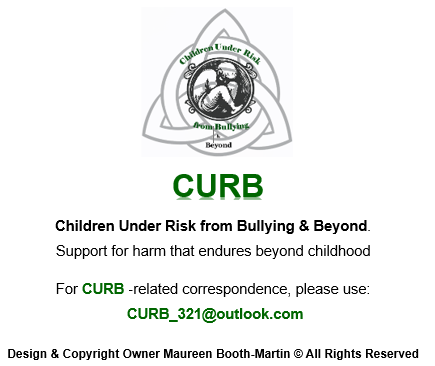Guidelines for Parents

CURB has updated its guidelines to reflect nearly three decades of lived experience and documented outcomes. These steps are designed to protect children, support parents, and hold schools accountable.
Step 1: Gather Information
Before contacting the school, gather as much detail from your child as possible:
- What has been happening
- Who is involved
- How long it has been going on
Step 2: Report in Writing
Do not visit or call the school to report bullying.
Instead, submit a written report. CURB provides a sample letter for parents.
Verbal reports — especially emotional ones — can lead to delays, miscommunication, or retaliation. Written documentation protects both the child and the process.
CURB’s Record-Keeping
CURB does not store personal data on children or families.
However, we do document:
- How parents report bullying
- How schools respond
- Time taken to address issues
- Outcomes and escalation patterns
Common Pitfalls
- Schools may delay action or mishandle reports
- Some staff may confront bullies informally, leading to denial or retaliation
- Victims may be portrayed as aggressors
- Children may beg parents not to pursue complaints out of fear
In some cases, schools have removed victims from class and placed them with their tormentors — without parental consent. This is unacceptable.
Emotional Impact
Children often disclose bullying only when they feel isolated and overwhelmed.
Parents may feel relief after reporting — but CURB’s data shows that bullying often intensifies once perpetrators learn they’ve been named.
Involve Your Child
Always:
- Involve your child in decisions
- Keep them informed at every stage
- Let them express what they want to see happen
Explain your chosen course of action and why
Prepare for Meetings
- Plan your agenda ahead of time
- Request the school’s Anti-Bullying Policy
- If unavailable, ask when it will be provided
- Study the policy carefully — schools must follow it
If they don’t, you may be entitled to file an Official Formal Complaint.
Documentation Is Key
- Write a plan of action
- List events in date order
- Decide whether your child should attend the meeting
- Respect their wishes — keep the discussion light and supportive
After every meeting:
- Send written confirmation of who attended
- Summarise points discussed
- Document the agreed action plan
Recording and Consent
If note-taking is difficult, consider using a Dictaphone.
Most schools will allow this if they receive a copy of the recording and transcript.
During the initial meeting, clarify:
- Whether you consent to your child being questioned
- Whether you wish to be present during questioning
- That no confrontation with bullies should occur without support
School Attendance and Medical Support
Do not keep your child home without authorisation.
Unauthorised absence can lead to prosecution — and bullying is rarely accepted as a valid reason.
Instead:
- Book an appointment with your GP
- Request a medical certificate if needed
- Ask about referral to CAMHS (Child and Adolescent Mental Health Services)
CAMHS can help your child cope — and their involvement documents the severity of the bullying.
If Physical Assault Occurs:
- Visit A&E immediately
- Provide full details of the assault
- Photograph injuries if appropriate
- Inform the police — or ensure the hospital does
When contacting police:
- Request an appointment or home visit
- Record time and date of the call
- Note the officer’s name, rank, and number
- Ask for an incident number and keep it safe
- Follow up with a written account
If recording the interview, notify the police in advance.
When Is Bullying a Crime?
Not all bullying is criminal — but some forms are.
Report to police if your child experiences:
- Assault
- Theft
- Harassment or intimidation
- Threatening behaviour
- Abusive calls, texts, or emails (must be repeated and prolonged)
- Sexual assault
- Hate crimes
Legal Boundaries and ‘Loco Parentis’
Schools often claim they are acting in loco parentis — in place of a parent.
This is legally accepted under the Children’s Act 1989, which requires teachers to act with the care of a “reasonable parent.”
However:
- This does not override civil liberties
- Schools cannot question your child without consent
- Schools must not force confrontations without support
Parents must clarify from the outset:
- When and why they withhold consent
- That bullying-related questioning requires parental presence
- That everyday issues may be discussed without consent — but bullying matters must follow an acceptable format
Final Two Points:
- Protect your child’s safety and wellbeing
- Document everything
Acknowledgements
CURB thanks our volunteers — especially Ann Ward, John Hardhall, Kerry Knight, and Amy Thomas — for their continuous support and assistance.




